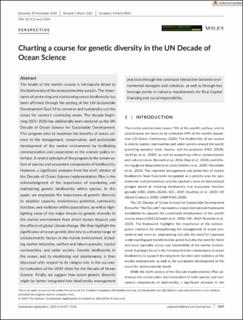| dc.contributor.author | Thomson, Alex Innes | |
| dc.contributor.author | Archer, Frederick I. | |
| dc.contributor.author | Coleman, Melinda Ann | |
| dc.contributor.author | Gajardo, Gonzalo | |
| dc.contributor.author | Goodall-Copestake, William P. | |
| dc.contributor.author | Hoban, Sean | |
| dc.contributor.author | Laikre, Linda | |
| dc.contributor.author | Miller, Adam D. | |
| dc.contributor.author | O’Brien, David | |
| dc.contributor.author | Pérez-Espona, Sílvia | |
| dc.contributor.author | Segelbacher, Gernot | |
| dc.contributor.author | Serrão, Ester A. | |
| dc.contributor.author | Sjøtun, Kjersti | |
| dc.contributor.author | Stanley, Michele S. | |
| dc.date.accessioned | 2022-04-07T10:59:44Z | |
| dc.date.available | 2022-04-07T10:59:44Z | |
| dc.date.created | 2022-01-13T18:02:58Z | |
| dc.date.issued | 2021 | |
| dc.identifier.issn | 1752-4571 | |
| dc.identifier.uri | https://hdl.handle.net/11250/2990489 | |
| dc.description.abstract | The health of the world's oceans is intrinsically linked to the biodiversity of the ecosystems they sustain. The importance of protecting and maintaining ocean biodiversity has been affirmed through the setting of the UN Sustainable Development Goal 14 to conserve and sustainably use the ocean for society's continuing needs. The decade beginning 2021–2030 has additionally been declared as the UN Decade of Ocean Science for Sustainable Development. This program aims to maximize the benefits of ocean science to the management, conservation, and sustainable development of the marine environment by facilitating communication and cooperation at the science–policy interface. A central principle of the program is the conservation of species and ecosystem components of biodiversity. However, a significant omission from the draft version of the Decade of Ocean Science Implementation Plan is the acknowledgment of the importance of monitoring and maintaining genetic biodiversity within species. In this paper, we emphasize the importance of genetic diversity to adaptive capacity, evolutionary potential, community function, and resilience within populations, as well as highlighting some of the major threats to genetic diversity in the marine environment from direct human impacts and the effects of global climate change. We then highlight the significance of ocean genetic diversity to a diverse range of socioeconomic factors in the marine environment, including marine industries, welfare and leisure pursuits, coastal communities, and wider society. Genetic biodiversity in the ocean, and its monitoring and maintenance, is then discussed with respect to its integral role in the successful realization of the 2030 vision for the Decade of Ocean Science. Finally, we suggest how ocean genetic diversity might be better integrated into biodiversity management practices through the continued interaction between environmental managers and scientists, as well as through key leverage points in industry requirements for Blue Capital financing and social responsibility. | en_US |
| dc.language.iso | eng | en_US |
| dc.publisher | Wiley | en_US |
| dc.rights | Navngivelse 4.0 Internasjonal | * |
| dc.rights.uri | http://creativecommons.org/licenses/by/4.0/deed.no | * |
| dc.title | Charting a course for genetic diversity in the UN Decade of Ocean Science | en_US |
| dc.type | Journal article | en_US |
| dc.type | Peer reviewed | en_US |
| dc.description.version | publishedVersion | en_US |
| dc.rights.holder | Copyright 2021 The Author(s) | en_US |
| cristin.ispublished | true | |
| cristin.fulltext | original | |
| cristin.qualitycode | 2 | |
| dc.identifier.doi | 10.1111/eva.13224 | |
| dc.identifier.cristin | 1980768 | |
| dc.source.journal | Evolutionary Applications | en_US |
| dc.source.pagenumber | 1497-1518 | en_US |
| dc.identifier.citation | Evolutionary Applications. 2021, 14 (6), 1497-1518. | en_US |
| dc.source.volume | 14 | en_US |
| dc.source.issue | 6 | en_US |

